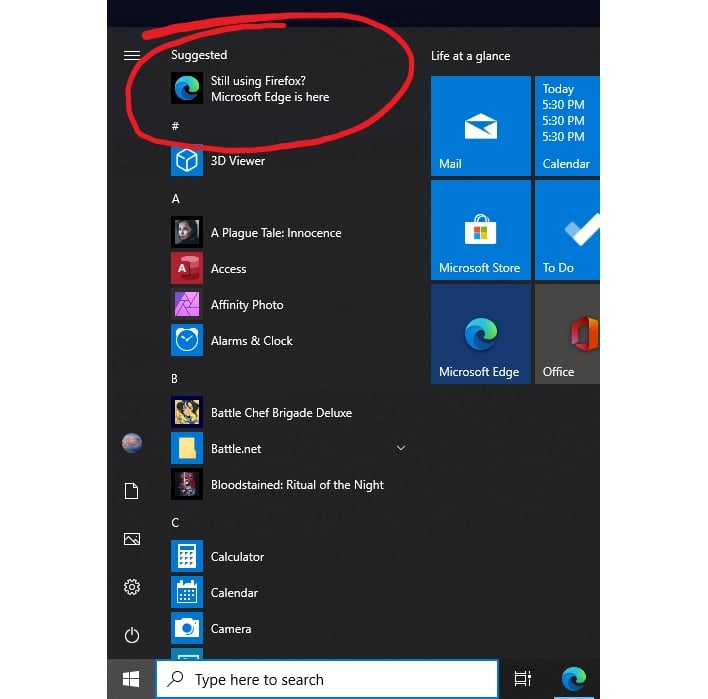The free, non-profit browser for your desktop and mobile devices. Firefox is created by a global non-profit dedicated to putting individuals in control online. We’ve always designed Firefox to protect and respect your private information. That’s why we’re proud to be voted the Most Trusted Internet Company for Privacy.

Here, Microsoft Edge and Google Chrome went nearly neck to neck, while Firefox fell to last place. Overall, Chrome is the fastest browser of the four after averaging the two test scores together. To import favorites from Internet Explorer, Chrome, or Firefox into Microsoft Edge, follow these steps. In Microsoft Edge, select Settings and more Settings Import from another browser. Choose the browser from which you want to import (only the browsers installed on this computer will be shown in the list) and then select Import. It’s Edge V Firefox in the browser wars Unlike Mozilla owner Firefox, Microsoft has a wide audience it can potentially push the browser to, through its Windows operating system.
/https%3A%2F%2Fspecials-images.forbesimg.com%2Fimageserve%2F5f27cceb043afa7689938f64%2F0x0.jpg)
Microsoft Edge Bookmarks Import From Firefox
Search faster in the address bar. No need to go to a website to search for pictures of adorable penguins. Stay put and save time by entering your search in the handy address bar. You’ll get search suggestions, results from the web, your browsing history, and favorites right on the spot. Microsoft Edge is the only browser that lets you take notes, write, doodle, and highlight directly on webpages. Add a few secret ingredients to a recipe right on the screen to share with your fellow amateur chefs, collaborate on a new project with your coworkers, or have fun with your kids—the web is your palette.
Microsoft Edge Firefox Lockwise

Microsoft Edge Vs Firefox Reddit
2021. Microsoft Edge now starts up faster and gets vertical tabs
Long-awaited vertical tabs in Microsoft Edge are now generally available. In addition, the new Edge will start significantly faster (up to 41% faster according to Microsoft’s preliminary tests, to be precise). Since Microsoft can’t speed up your hard drive or significantly shrink Edge, though, the way the team achieves this is by loading the browser in the background when you sign in and then it’ll continue running when you close all browser windows. If that’s not to your liking, you can always turn this feature off.
2020. Microsoft’s Edge browser is coming to Linux
When Microsoft announced that it would switch its Edge browser to the Chromium engine, it vowed to bring it to every popular platform. At the time, Linux wasn’t part of that list, but by late last year, it became clear that Microsoft was indeed working on a Linux version. From now Linux users will be able to either download the browser from the Edge Insider website or through their native package managers. Linux users will get the same Edge experience as users on Windows and macOS, as well as access to its built-in privacy and security features.
2020. Microsoft Edge gets a Pinterest integration, sidebar search and automatic profile switching
Microsoft Edge browser is getting a bunch of new features. The first is an integration with Pinterest and Edge’s collections feature. In addition to the Pinterest integration, collections is also getting the ability to send items to Microsoft’s OneNote note-taking tool, which is in addition to its existing Word and Excel integrations. Also new in Edge is Sidebar Search. This, as the name implies, will allow you to do your searches in the sidebar without having to open a new tab in your main browser window. That sidebar will also be persistent as you move between tabs, making this a nifty idea and something that others will surely emulate over time. For those of us who often mix business and personal accounts on the same machine and in the same browser, Edge is now introducing automatic profile switching.
2020. Firefox gets a better password manager
Mozilla launched version 76 of its Firefox browser with enhanced password manager. Firefox Lockwise will now ask you for your device password when you try to copy and paste credentials from your “Logins and Passwords” page in the browser. After you’ve confirmed your device password, you can see and copy your credentials for five minutes. This should make it a bit harder for others to access password-protected sites on your machine, especially if you’re on a computer you regularly share with others. Also new to Lockwise are alerts for vulnerable passwords that are identical to those that have been stolen in a known breach, as well as warnings when a website you use has been breached and your logins and passwords were likely stolen. In addition, Lockwise’s password generator now works with more sites and will help you find 12 random letters, numbers and symbols for you to use as your password.
2019. Firefox gets enhanced tracking protection, desktop password manager
Firefox team is launching one of its broadest sets of releases that aim to keep advertisers and others from following you across the web, while also making it harder for Facebook to track you. In its standard setting, which is the default, Enhanced Tracking Protection will block all third-party tracking cookies, based on the Disconnect list. You can also opt for a strict setting, which may break some sites, or opt for your own custom settings, too. Mozilla is also expanding its Lockbox password manager to the desktop. Until now, Lockbox only existed as a set of mobile apps, but Mozilla launched a Firefox desktop extension, too. It’s also changing the name to Lockwise. It’s a pretty straightforward password manager experience, though, at least for the time being, notably not as fully featured as Dashlane, 1Password, LastPass or similar options.
2018. Firefox will now alert you when one of your accounts was hacked
Earlier this year, Mozilla announced Firefox Monitor, a service that tells you if your online accounts were hacked in a recent data breach. All you have to give it is your email address and it’ll use the Have I Been Pwned database to show you if you need to worry and what data was compromised. Today, Mozilla is taking this a step further by also letting you sign up for alerts for when your accounts appear in any (known) breaches in the future. Mozilla notes that Firefox Monitor is just one of a number of new data and privacy features the organization has on its roadmap for the next few months. It’s clear that Mozilla is positioning itself as a neutral force and overall, that seems to be going quite well, especially given that Google’s Chrome browser is facing a bit of a backlash these days as users are increasingly concerned about their privacy and the vast trove of data Google collects.
2018. Firefox ends support of Windows XP, Vista
Mozilla shut down Firefox's support for Windows XP and Windows Vista, ending browser security updates for the outdated operating systems. Support for the two past-expiration-date OSes - Microsoft dropped Windows XP in April 2014, Vista in April 2017 - ended with Firefox ESR 52.9, which was released June 26. That version was supplanted by Firefox ESR 60.2 on Sept. 4. Firefox ESR, for 'Extended Support Release,' is a version Mozilla issues to customers - primarily business users - who value stability over sexy new features. Unlike the standard Firefox, each ESR version receives only security updates during its tenure. About once a year, Mozilla replaces the existing ESR with the then-current Firefox, then maintains both the old and new ESR versions during a 12-week overlap period. Firefox ESR 52's overlap with ESR 60 began May 7, when the latter launched, and ended Sept. 4, when that date's security patches were not provided for the former. The only Top 5 browser still supporting Windows XP is Opera.
2018. Microsoft Edge gets password-less authenticator
Microsoft Edge users no longer need passwords to log onto their favorite websites. All they need is Microsoft's new web authenticator to get in, which relies on fingerprints, facial recognition, and special PINs. This new feature accessible via Windows Hello is akin to Google's and Firefox's authenticators, which launched months ago. So while it's revolutionary for Microsoft, the tech company is pretty far behind. No wonder Edge only holds 4.19 percent of the market share as of publishing time. The purely virtual nature of Web Authenticator means if someone gets ahold of your device, the interloper has no way of getting in, since there is no longer a system on the device to hack. Its entire security process is essentially outsourced to Microsoft as a third party.
2017. Microsoft Edge comes to Android and iPhone
Microsoft announced the general availability of its Edge Browser (the followup to Internet Explorer) for iOS and Android. The mobile version offers many of its familiar desktop/tablet features, including Favorites, Reading Lists and New Tab Pages. The company’s also added some new tools. Roaming Passwords are now on-board, giving users the ability to sync passwords cross platform on mobile and desktop. There’s also dark theme. That’s basically what it sounds like, offering a black desktop instead of the default white/gray one, which should be easier on some eyes. The addition of Edge is an important piece of Microsoft’s new mobile strategy. At the very least additions like Edge and Cortana to iOS and Android will make it easier for Windows 10 users to have their existing smartphones play nice with their PCs.
2017. Firefox released new ultra-fast web browser to take on Google Chrome
Mozilla's latest browser Firefox Quantum is really, really fast. In a test conducted with the open-source project WebPageTest, Firefox Quantum loaded a number of top websites before Chrome did, including Yelp, Shutterstock, Ask.com and even Google Search itself. (Chrome was still, of course, faster to load most Google and Youtube pages). The browser also uses around 30% less memory than its competitors Chrome, Edge, and Safari on Windows operating systems, and only uses a tiny bit more than Chrome on macOS. This means you can run 30% more tabs without your browser crashing or slowing to a crawl. But where the company hopes its browser will stand out the most is in the interface. The company extensively researched the way users navigate browsers, and Firefox Quantum has a number of small, but significant features to accommodate those patterns.

